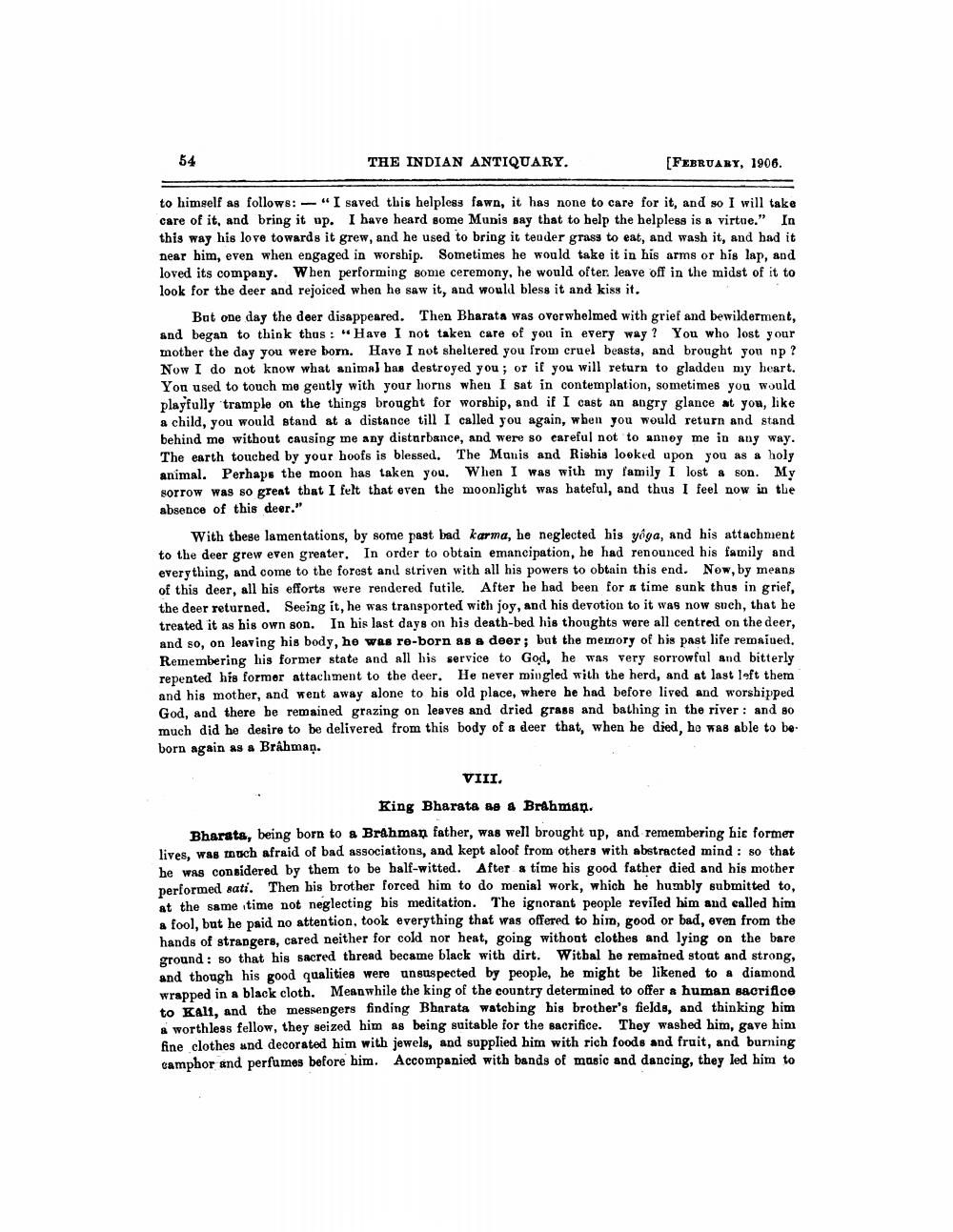________________
54
THE INDIAN ANTIQUARY.
-
[FEBRUARY, 1906.
to himself as follows: "I saved this helpless fawn, it has none to care for it, and so I will take care of it, and bring it up. I have heard some Munis say that to help the helpless is a virtue." In this way his love towards it grew, and he used to bring it tender grass to eat, and wash it, and had it near him, even when engaged in worship. Sometimes he would take it in his arms or his lap, and loved its company. When performing some ceremony, he would ofter leave off in the midst of it to look for the deer and rejoiced when he saw it, and would bless it and kiss it.
But one day the deer disappeared. Then Bharata was overwhelmed with grief and bewilderment, and began to think thus: "Have I not taken care of you in every way? You who lost your mother the day you were born. Have I not sheltered you from cruel beasts, and brought you up? Now I do not know what animal has destroyed you; or if you will return to gladden my heart. You used to touch me gently with your horns when I sat in contemplation, sometimes you would playfully trample on the things brought for worship, and if I cast an angry glance at you, like a child, you would stand at a distance till I called you again, when you would return and stand behind me without causing me any disturbance, and were so careful not to annoy me in any way. The earth touched by your hoofs is blessed. The Munis and Rishis looked upon you as a holy animal. Perhaps the moon has taken you. When I was with my family I lost a son. My sorrow was so great that I felt that even the moonlight was hateful, and thus I feel now in the absence of this deer."
With these lamentations, by some past bad karma, he neglected his yoga, and his attachment to the deer grew even greater. In order to obtain emancipation, he had renounced his family and everything, and come to the forest and striven with all his powers to obtain this end. Now, by means of this deer, all his efforts were rendered futile. After he had been for a time sunk thus in grief, the deer returned. Seeing it, he was transported with joy, and his devotion to it was now such, that he treated it as his own son. In his last days on his death-bed his thoughts were all centred on the deer, and so, on leaving his body, he was re-born as a deer; but the memory of his past life remained. Remembering his former state and all his service to God, he was very sorrowful and bitterly repented his former attachment to the deer. He never mingled with the herd, and at last left them and his mother, and went away alone to his old place, where he had before lived and worshipped God, and there he remained grazing on leaves and dried grass and bathing in the river and so much did he desire to be delivered from this body of a deer that, when he died, he was able to be born again as a Brahman.
VIII.
King Bharata as a Brahman.
Bharata, being born to a Brahman father, was well brought up, and remembering his former lives, was much afraid of bad associations, and kept aloof from others with abstracted mind: so that he was considered by them to be half-witted. After a time his good father died and his mother performed sati. Then his brother forced him to do menial work, which he humbly submitted to, at the same time not neglecting his meditation. The ignorant people reviled him and called him a fool, but he paid no attention, took everything that was offered to him, good or bad, even from the hands of strangers, cared neither for cold nor heat, going without clothes and lying on the bare ground: so that his sacred thread became black with dirt. Withal he remained stout and strong, and though his good qualities were unsuspected by people, he might be likened to a diamond wrapped in a black cloth. Meanwhile the king of the country determined to offer a human sacrifice to Kali, and the messengers finding Bharata watching his brother's fields, and thinking him a worthless fellow, they seized him as being suitable for the sacrifice. They washed him, gave him fine clothes and decorated him with jewels, and supplied him with rich foods and fruit, and burning camphor and perfumes before him. Accompanied with bands of music and dancing, they led him to




